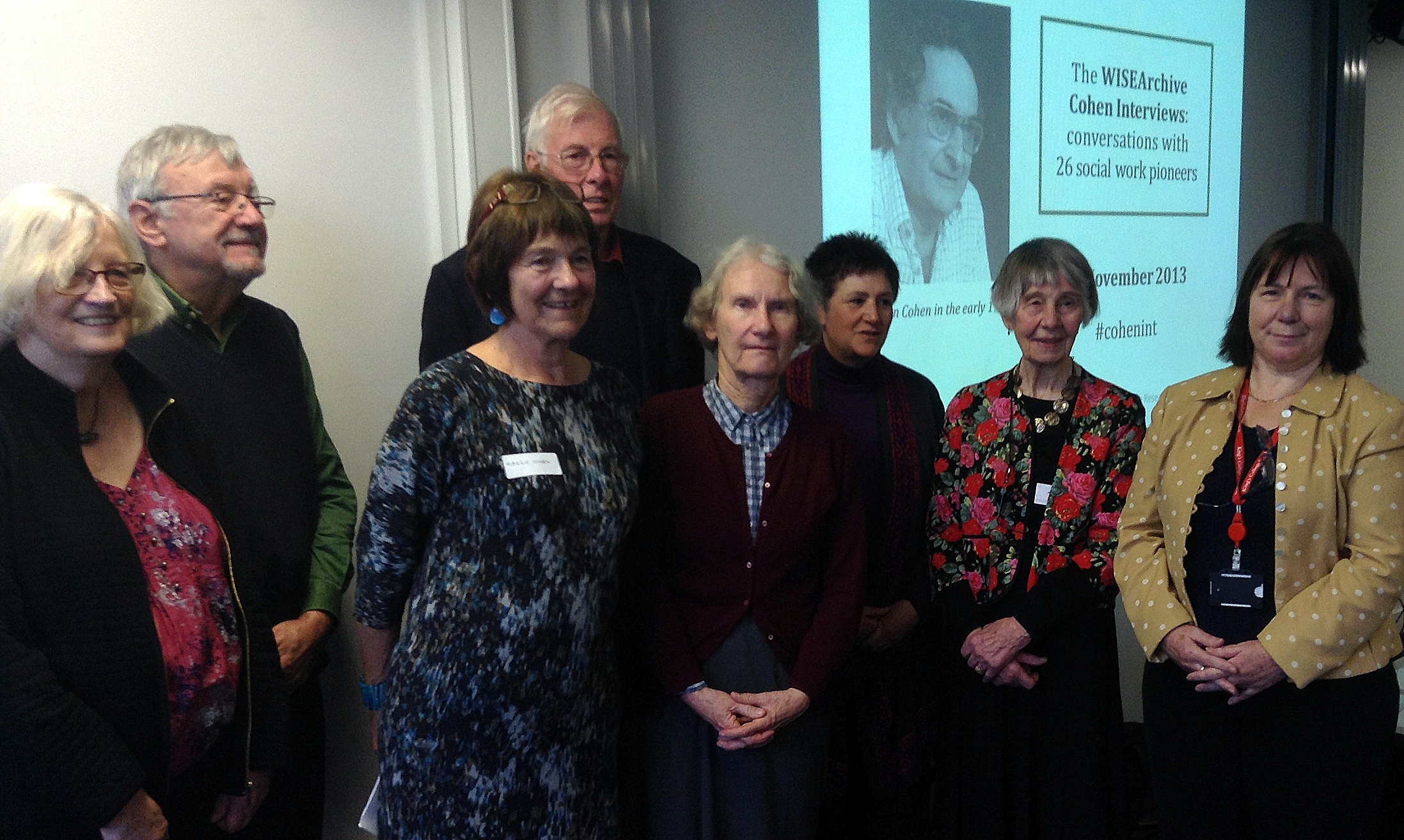Katie Graham, Research Associate at the Social Care Workforce Research Unit, on why we should listen to the recordings of a group of interviews with social workers from the early 1980s.
The Social Care Workforce Research Unit at King’s recently hosted the launch of The WISEArchive Cohen Interviews, a fascinating collection of conversations with 26 social workers reflecting on the early days of the profession. We heard how Alan Cohen during the 1980s had sought out social workers he felt to be pioneers of the profession charting social work activity as early as the 1930s including well-known members of the profession, such as Clare Britton (later Winnicott), Eileen Younghusband, Rose Mary Braithwaite, Enid Warren and Margaret Simey amongst others. These tapes have thankfully been revived, transcribed by volunteers at WISEArchive and edited by Tim Cook and Harry Marsh after 30 years in storage.
Maggie Cohen, herself a social worker, Alan’s partner, shared Alan’s journey through social work, Family Service Units, Social Work lecturing and returning to full-time social work before retiring in 1996. Alan Cohen undertook the interviews with the intention of developing a book, but this did not materialise. Tim Cook described how he and Harry Marsh were invited by WISEArchive to edit, annotate and add context to the interviews with the aim of beginning to realise Alan Cohen’s vision. This work, along with all of the interviews, have now been archived by the Modern Records Centre at the University of Warwick and published online together with the original tapes.

Participants at the launch on 28 November at King’s (left to right): Olwen Gotts (volunteer transcriber), Harry Marsh (editor), Maggie Cohen, Tim Cook (editor), Barbara Prynn, Helen Ford (Modern Records Centre), Pauline Weinstein (WISEArchive), Professor Jill Manthorpe (King’s College London)
One of the first questions Alan Cohen asked of his interviewees was how and why they chose social work. At the launch event, Pauline Weinstein, the director of WISEArchive, posed the same question to Barbara Prynn. The answer given by Barbara, as I suspect to be the case for many social workers both now and then, is not entirely straightforward and prompted many questions and comments from the audience. Remembrances of social work’s foundation as a negotiation between common sense, practical social work and the ‘psychoanalytical fringe’ and the cycles of policy making and changes in perceptions of ‘good’ and ‘oppressive’ practice. These interviews narrate the forming of ‘Social Work’ as a profession from the formative social sciences course at the London School of Economics (amongst others) and disparate professions of Psychiatric Social Work and Almoners. The coming, going and perhaps coming again (in Scotland at least) of community work, genericism versus specialism in practice as well as more foundational perspectives of the social work role and analysis of the individual and of structural inequalities were also areas of discussion and comment.
Listening to some of these interviews whilst writing this blog I would urge social workers and anyone interested in social work to play the tapes (very easy to do). When Alan Cohen asked Enid Warren why she became a social worker she described it as, not an active choice, but the result of a ‘process of elimination’. Geraldine Aves said ‘I had no intention of being a social worker’, but became a social worker ‘very much by the backdoor’ and Clare Winnicott took a long pause before she cited her family’s influence. Although the route into social work may not have been clear, there seemed to be a common thread amongst the interviewees of a determination to do something that could be useful.
Entry into social work is probably rarely uneventful and neither is the career. For myself, the daughter of two social workers, my choice may have been unimaginative. As a social worker I have experienced ambivalence about statutory social work practice this event and these archives offered the opportunity to look back, hear social workers talk about their experiences and dilemmas, and reflect on them in our current situation. The history of social work is a history of change, within, outside and hopefully because of the profession. Drawing on this history during the introduction to the launch of the archives Professor Jill Manthorpe of the Social Care Workforce Research Unit at King’s College London, the host of the launch, positioned this as its strength, adding her personal view that ‘all social workers are pioneers’, members of an evolving and hopefully responsive profession. I left this event in a reflective mood, keen to listen more and would like to thank all involved in making these archives accessible to us all.
Katie Graham is Research Associate at the Social Care Workforce Research Unit at King’s College London. The launch event took place at King’s on 28 November 2013. Those with an interest in social work history may also like to join the Social Work History Network.
@scwru | @wisearchive | #cohenint

